The Environmental Benefits of a Vegetarian or Vegan Diet
Written by Johanna van Langen
Published 24 September 2024
Our planet is facing critical challenges like climate change, water scarcity, deforestation, and biodiversity loss which threaten ecosystems and future generations. These environmental issues are all linked to our food system, particularly animal agriculture.
By choosing plant-based foods, you can reduce your environmental footprint and contribute to a more sustainable future. In this blog post, you’ll learn how a vegetarian or vegan diet benefits the environment and how your food choices can make a difference for the planet.
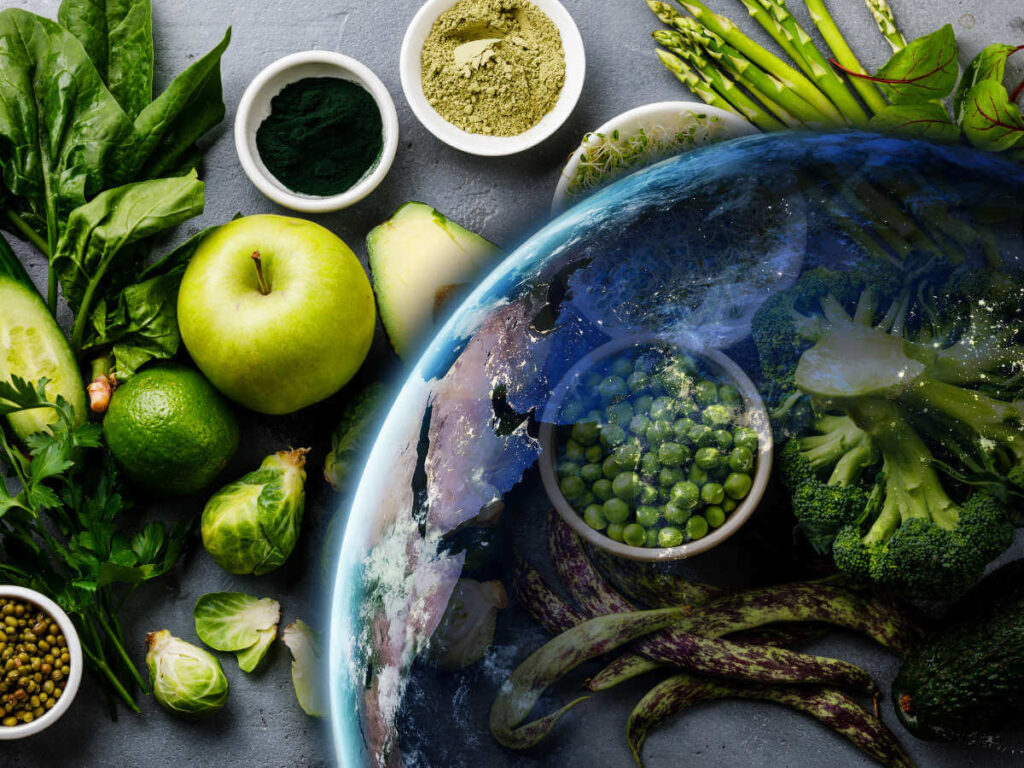
Calculate the environmental impact of your diet
1. Reduce Your Carbon Footprint to Fight Climate Change
Climate change is a direct result of global warming, largely driven by human activity. Its consequences include extreme weather, rising sea levels, and species extinction. Scientists warn that exceeding a 1,5°C rise in global temperature could trigger irreversible changes in the global ecosystem. With temperatures already 1,1°C higher and rising 0,2°C per decade, we must take action fast.
How Animal Agriculture Contributes to Global Warming
Our food system emits one-third of all greenhouse gases with animal agriculture contributing more than half while providing only 18% of global calories. The inefficiency of the production process of animal-based foods is the main reason for these high emissions.
Carbon dioxide (CO2): Massive deforestation for animal feed crops and grazing pastures releases large amounts of carbon dioxide. Additionally, the entire supply chain, from planting crops to processing meat, relies heavily on fossil fuels, further increasing carbon dioxide emissions. Since carbon dioxide remains in the atmosphere for hundreds of years, reducing emissions is critical.
Methane (CH4): The digestive system of livestock produces methane and animal farming contributes 44% of human-related methane emissions. Methane has a 28 times higher global warming potential than carbon dioxide, but only lasts 12 years in the atmosphere. This means that reducing methane emissions from livestock can have a quick positive impact on climate change.
Nitrous oxide (N2O): Nitrous oxide has a global warming potential 265 times higher than carbon dioxide and is released from fertiliser used to grow crops. Because animal agriculture consumes high quantities of feed crops, it’s responsible for 65% of human-related nitrous oxide emissions.
Lower Your Carbon Footprint With a Vegan Diet
To limit global warming, we need to transition towards a plant-based food system. Eating more plant-based is one of the most effective ways to reduce your carbon footprint. A vegetarian diet can reduce your food-related emissions by 58%, while a vegan diet can lower it by up to 75%, along with many other environmental benefits.
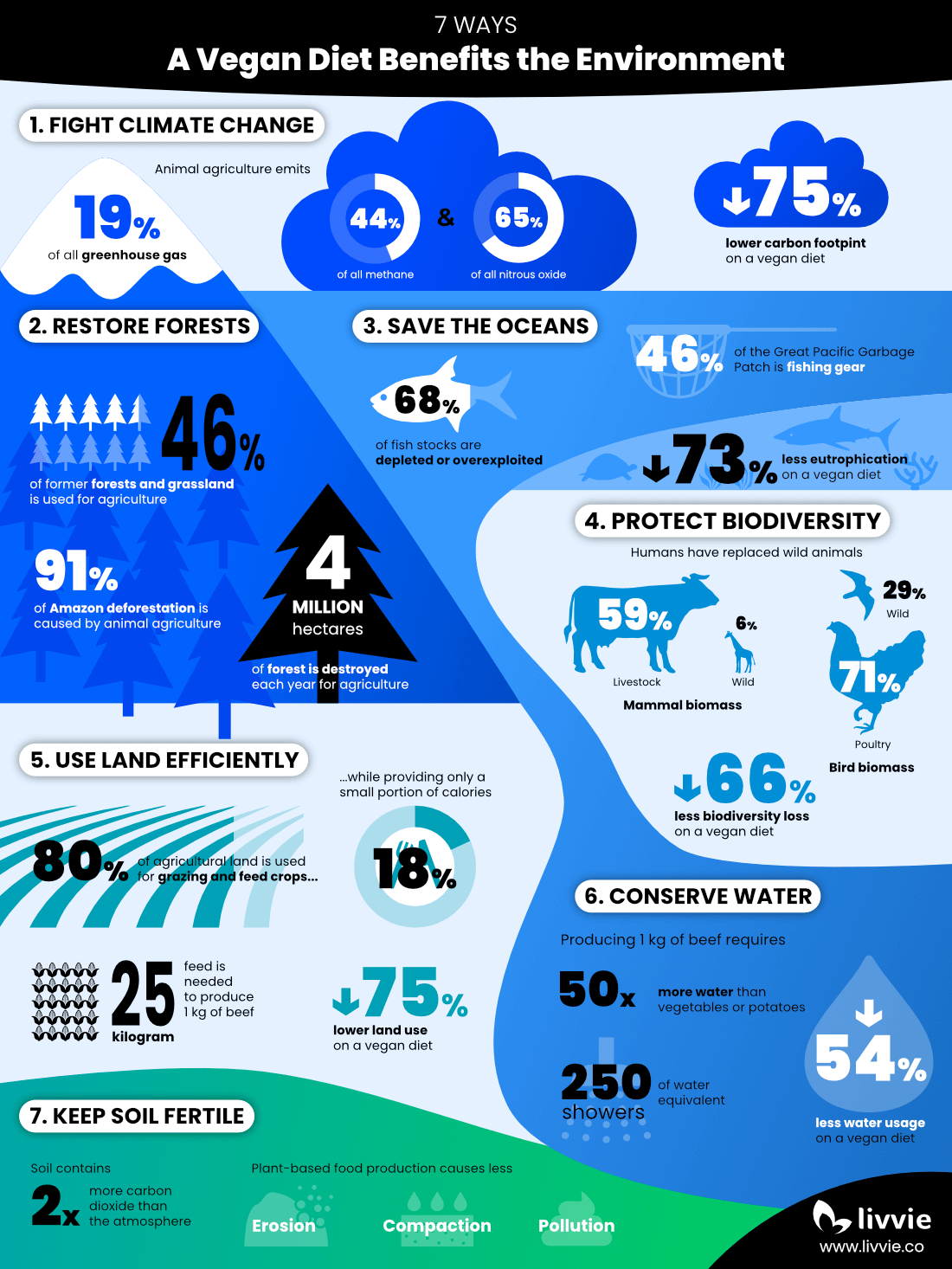
2. Use Land More Efficiently
Land is a finite resource under immense pressure as we try to sustain a global population of 8 billion people. Currently, half of Earth’s habitable land is used for agriculture, primarily to support livestock farming.
How High Land Use for Meat Impacts the Environment
Livestock farming occupies 80% of all agricultural land to grow feed crops or as grazing pastures, despite contributing only 18% of global calorie intake. This illustrates the inefficiency of using land for animal agriculture.
Beef production, in particular, demands 100 times more land to produce the same amount of calories as certain plant-based foods like beans or nuts. During the conversion of feed into animal products, a lot of nutrients are wasted that could have been used to feed people. For example, it takes 25 kilograms of feed to produce 1 kilogram of beef, wasting 98% of calories and 96% of protein.
Clearing land for animal agriculture emits carbon dioxide, destroys natural habitats, and accelerates biodiversity loss. Moreover, agricultural practices cause soil erosion, water depletion, and pollution from fertiliser and manure, further degrading the environment.
A Vegan Diet Saves Land and Food
Adopting a vegan diet can reduce your land use up to 75%. This shift would free up land for reforestation and carbon capture, giving ecosystems and biodiversity a chance to recover. Instead of using land to feed 31 billion farm animals, we could use it to fight food insecurity for billions of people.
3. Restore Forests and Nature
The vast amount of land needed to feed livestock comes at the expense of nature. Today, 46% of land once covered by forests and grasslands is used for agriculture, with serious environmental consequences.
How Animal Agriculture Drives Deforestation
Each year, 5 million hectares of forest are lost, largely to support our food system. Animal agriculture is responsible for the majority of deforestation due to the need for grazing land and growing feed crops like soybeans. The expanding global demand for meat particularly affects tropical rainforests such as the Amazon.
Forests are essential for maintaining a healthy global ecosystem. They provide habitat for much of Earth’s biodiversity and play a critical role in regulating the freshwater cycle. Forests also protect the soil from erosion and desertification through their extensive root networks. Importantly, forests capture carbon dioxide through photosynthesis, helping to fight climate change. However, deforestation releases stored carbon and accelerates global warming.
A Vegan Diet Helps Save Forests
By reducing meat consumption or adopting a vegan diet, you help reduce the demand for land used in livestock farming and save forests. This protects biodiverse ecosystems while enabling reforestation to capture carbon dioxide and mitigate climate change.
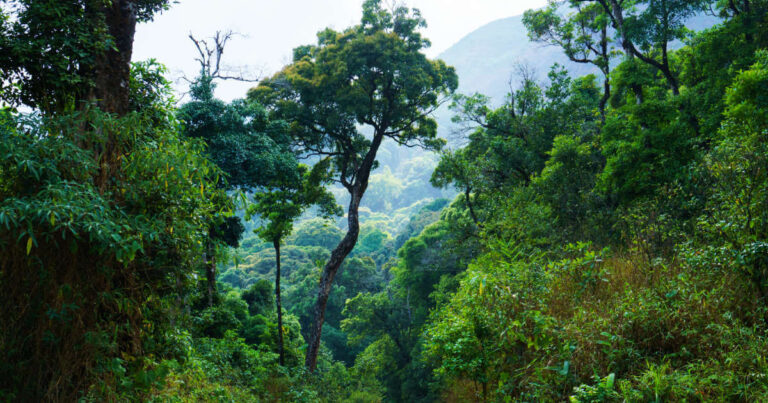
4. Keep Soil Healthy and Fertile
Healthy soil is fundamental for the environment and farming by sustaining biodiversity, regulating water flow, and buffering nutrients. However, intensive agricultural practices and animal farming have degraded soil quality, threatening future crop yields and food security.
How Unsustainable Agriculture Causes Soil Degradation
Heavy farm machinery and the loss of natural vegetation cause soil compaction, reducing its ability to absorb water and causing waterlogging. Poor irrigation practices can increase soil salinity which damages plant growth. Monocultures weaken soil resilience, increasing the need for pesticides which harm soil organisms and biodiversity.
Healthy soils store carbon in organic matter and protect against droughts, desertification, and floods. Soil erosion releases carbon dioxide into the atmosphere and makes land more vulnerable to the consequences of climate change.
Animal agriculture places excessive strain on soils due to its high land use as well as livestock specific effects. Manure runoff contaminates soil and waterways where it causes eutrophication. Loss of vegetation due to overgrazing depletes nutrients, increases erosion, and disrupts ecosystems.
A Vegan Diet Maintains Healthy Soils
Switching to a vegan diet reduces the demand for land-intensive animal farming, alleviating pressure on soils. Plant-based agriculture requires fewer resources, minimising soil degradation and reducing the need for fertiliser and pesticides. By adopting a plant-based diet, you help preserve soil health, support sustainable farming, and protect future harvests.
5. Lower Your Water Footprint
Fresh water is essential for life, but only 3% of the Earth’s water is fresh, with an even smaller portion available for human use. Although renewable, fresh water is under severe pressure due to overuse, pollution, and climate change, with many regions already experiencing water scarcity.
Why Animal Agriculture Has a High Water Footprint
Agriculture accounts for 70% of global freshwater use, with 40% of food production relying on irrigation from freshwater resources. Animal farming is particularly water-intensive, as it requires large amounts of water to grow feed crops that yield relatively few calories.
Beyond water use, animal agriculture and fish farming heavily pollute waterways. Fertiliser and manure release excess nitrogen and phosphorus into waterways, causing eutrophication which creates ‘dead zones’ where aquatic life can’t survive. Pesticides and harmful pharmaceuticals also contaminate water sources, impacting both human health and freshwater ecosystems.
Deforestation, often driven by animal agriculture, disrupts the natural freshwater cycle by reducing vegetation that stores and filters water. This exacerbates climate change, including altered rainfall patterns and droughts which further strain water resources.
Reduce Your Water Footprint With a Vegan Diet
Adopting a vegetarian or vegan diet drastically lowers your water footprint. Producing 1 kilogram of beef requires 15.000 litres of water, which is 50 times more than what’s needed to grow vegetables or potatoes. By eating vegan, you can reduce your water usage by 54% and decrease eutrophication by 73%.

6. Save the Oceans
Oceans cover 71% of Earth’s surface and are essential to the planet’s environmental balance. They support global biodiversity, produce oxygen, and regulate the climate. However, overexploitation has pushed marine ecosystems to the limit, threatening life across the globe.
How Fishing Destroys Ocean Ecosystems
Fishing is the leading cause of ocean destruction. Overfishing disrupts marine food chains and has already overexploited 68% of global fish stocks. This destabilises ecosystems, as species that rely on specific prey or predators struggle to survive.
Destructive fishing practices like bottom trawling destroy marine habitats like coral reefs, while fishing lines and nets unintentionally kill dolphins, whales, sea birds, and other wildlife. Lost or discarded fishing gear is a major contributor to ocean pollution, making up 46% of the Great Pacific Garbage Patch, where it continues to trap and kill marine animals.
The Impact of Animal Agriculture on Ocean Health
Animal agriculture and fish farming contribute to ocean eutrophication. Runoff from fertiliser and manure introduces excess nutrients into coastal waters, causing algal blooms that block sunlight and deplete oxygen. Livestock and fish farming further pollute coastal waters with antibiotics, pesticides, and waste.
Oceans are further impacted by global warming, much of which is driven by animal agriculture. Rising sea temperatures reduce oxygen levels, while oceans absorb excess carbon dioxide from the atmosphere, leading to acidification. These changes disrupt marine ecosystems and contribute to coral bleaching.
Stop Eating Fish to Save the Oceans
To protect the oceans, the most effective step is to stop consuming fish and shellfish. By embracing a vegetarian or vegan diet, you reduce overfishing, pollution, and the strain on marine ecosystems. Additionally, a plant-based diet helps mitigate climate change, further protecting ocean health.
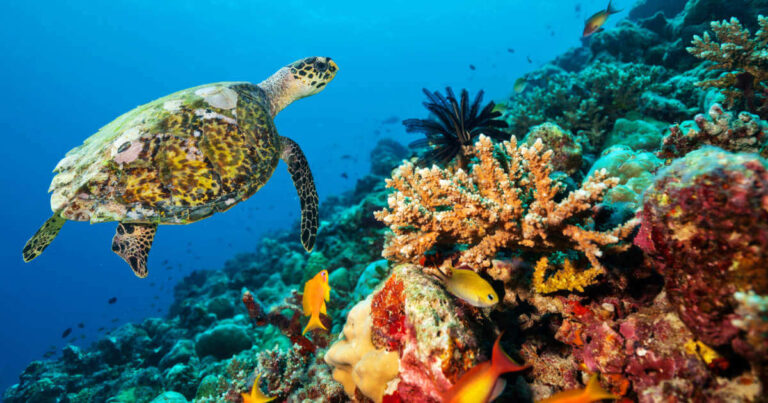
7. Protect Wildlife Habitats and Biodiversity
Biodiversity is essential for maintaining healthy ecosystems, where each species has a vital role. When habitats and biodiversity are disrupted, it triggers a cycle of environmental degradation. Unfortunately, biodiversity is under critical threat as many plant and animal species have already gone extinct, and 1 million more are at risk.
The Impact of Animal Agriculture on Terrestrial Biodiversity
Animal agriculture significantly harms wildlife and their habitats. Wild mammals now make up only 6% of mammal biomass, while humans account for 36% and livestock 59%. Wild birds represent just 29% of bird biomass, overshadowed by 71% poultry.
Agriculture is the leading cause of global biodiversity loss, threatening 86% of species at risk of extinction. Converting half of Earth’s fertile land into cropland or grazing pastures has displaced native plants and animals, leading to habitat loss and species extinction. Agriculture also pollutes the environment with fertiliser, manure, and pesticides, further affecting local flora and wildlife.
The Impact of Fishing and Climate Change on Marine Biodiversity
Overfishing, bycatch, and abandoned fishing gear have severely depleted marine ecosystems. Runoff from animal farming causes ocean eutrophication, creating dead zones where marine life can no longer survive.
Global warming and ocean acidification are destroying coral reefs and species that depend on them. With global warming on track to exceed 2°C, nearly all coral reefs are expected to vanish, with devastating effects on marine biodiversity.
A Vegan Diet Helps Protect Wildlife
Adopting a vegan or vegetarian diet reduces the demand for animal agriculture and fishing, helping to protect wildlife habitats. By minimising the environmental harm of these industries, you can reduce your impact on biodiversity with 66% and help prevent further species extinction.
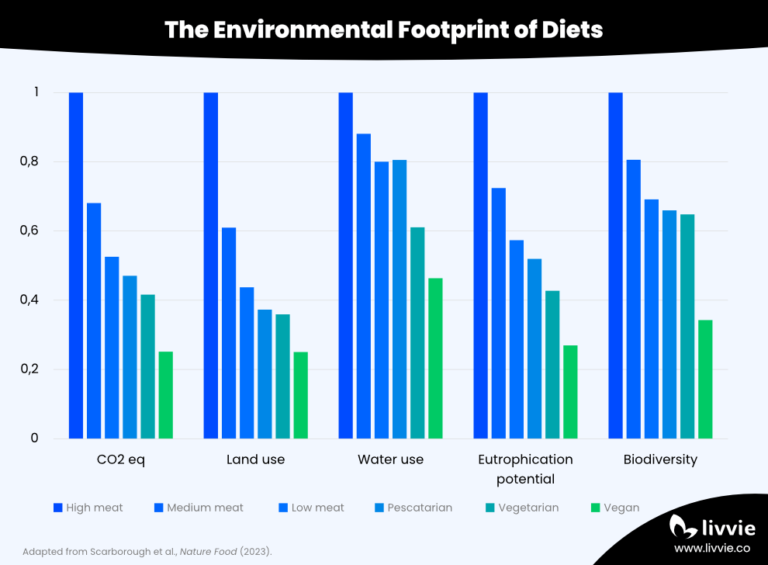
A Vegetarian or Vegan Diet Benefits the Environment in Several Ways
Adopting a vegetarian or vegan diet has several benefits for the environment and is one of the most effective ways to reduce your ecological footprint. By eating more plant-based, you lower your carbon emissions, conserve water, and protect wildlife habitats like forests and oceans. This is how small changes in your diet can help mitigate climate change and prevent biodiversity loss.
Whether you go fully vegan or simply eat less meat, every meal can contribute to a healthier planet for future generations. Start today and track the positive impact of your food choices on the environment with the Livvie diet impact calculator.
Share this article to inspire others to help protect the environment by choosing vegan food more often.
Track Your Impact
Inspire your vegetarian or vegan food choices by calculating your impact on 22 parameters.


